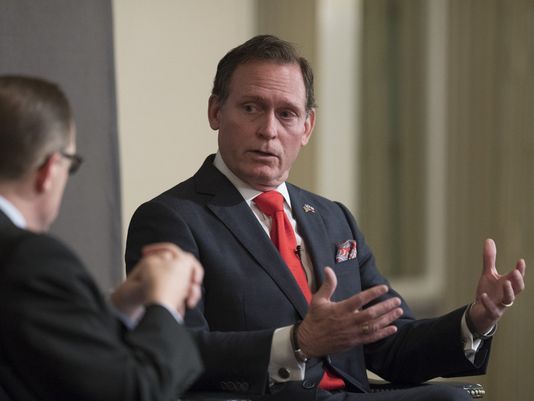The chief budget writer in the Texas House on Friday proposed using $1.4 billion from the state’s savings account to pay bills coming due for a wide array of the state’s health and human services programs.
The proposal from state Rep. John Zerwas, R-Richmond, would continue pay raises for Child Protective Services workers that state leaders ordered last year. It would also pay for renovations at the state’s aging mental health hospitals and state-supported living centers for people with disabilities.
And it would partially reverse a sweeping $350 million budget cut to a therapy program for children with disabilities ordered by the Texas Legislature in 2015.
The funding would come from the state’s Economic Stabilization Fund, also known as the Rainy Day Fund, a savings account lawmakers may use in tight budget years. That fund currently has about $10 billion.
“Using a small portion of the Economic Stabilization Fund, combined with spending reductions, is the responsible way for us to close out the current budget cycle and respond to the slowdown in our economy,” Zerwas said in a prepared statement.
The proposal comes in the form of a supplemental budget, which would plug funding holes left by lawmakers in 2015. Most legislative sessions, the Texas Legislature does not fully fund the cost of state programs, so lawmakers must typically pass a supplemental bill to cover the rest.
Zerwas’ proposal would also reverse some cuts intentionally made by the Legislature in 2015. The most significant of those was a $350 million reduction cut to therapy services in Medicaid, consisting of $150 million in state funds and $200 million in federal dollars. That cut reduced the amount that the federal-state insurance program for the poor and disabled paid speech, physical and occupational therapists who serve medically fragile children.
After lawmakers vowed to reverse those cuts amid widespread opposition from therapy providers and the families of children who receive their services, Zerwas’ proposal would restore about one-third of the funding.
The supplemental budget also offers $50 million to increase bed capacity at the state’s mental health hospitals and in mental health community hospitals. Decrepit, crumbling hospital buildings and a growing Texas population has caused the state’s per-capita psychiatric hospital capacity to fall, from 11.3 to 10.5 beds per 100,000 people between 2013 and 2015.
State lawmakers have less money at their discretion this year when crafting the next two-year budget. By cutting taxes in 2015, the Legislature reduced available state revenue by about $4 billion. Lawmakers also dedicated nearly $5 billion that year to highways — a move that voters later approved in a statewide election — which left fewer dollars available to pay for health care and education.
In addition, a moderately sluggish economy slowed revenue growth, leaving the state’s coffers emptier than state officials had projected.
But a push to use the Rainy Day Fund to shore up the state’s finances is likely to be controversial. In January, Gov. Greg Abbott told lawmakers he was “confident we can balance the budget without looting the Rainy Day Fund.”
The Texas Tribune is a nonpartisan, nonprofit media organization that informs Texans — and engages with them – about public policy, politics, government and statewide issues.
Published by: San Angelo Standard-Times
Author: Edgar Walters
Original link: http://www.gosanangelo.com/story/news/local/texas/2017/03/03/texas-house-proposes-using-14b-rainy-day-fund/98700794/
